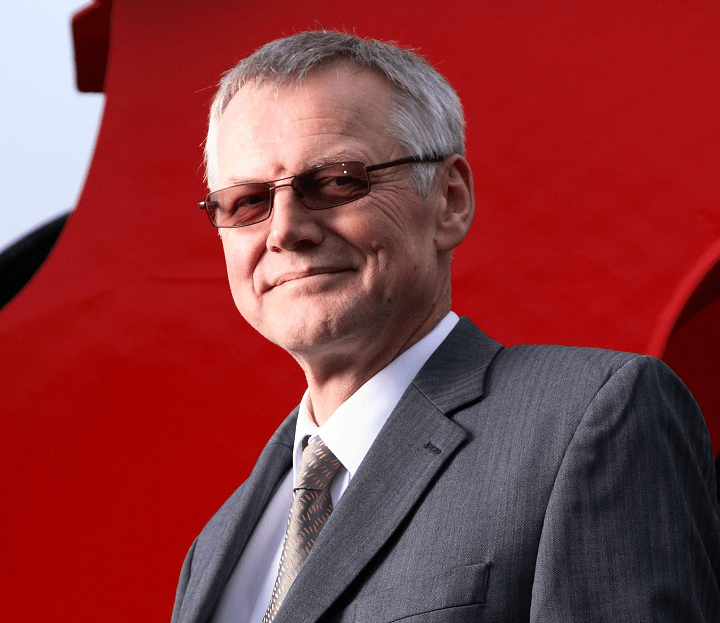 Ralph Saelzer is the Managing Director of Liebherr Sunderland Works Ltd., part of the maritime division of the Liebherr Group, a Switzerland-based family-run business established in 1949 that employs more than 40,000 people at more than 130 companies, with a €9.84 billion turnover.
Ralph Saelzer is the Managing Director of Liebherr Sunderland Works Ltd., part of the maritime division of the Liebherr Group, a Switzerland-based family-run business established in 1949 that employs more than 40,000 people at more than 130 companies, with a €9.84 billion turnover.
Liebherr Sunderland Works began production in 1989 as a manufacturing plant for maritime cranes and cargo handling equipment, including ship and port cranes, offshore cranes and mobile harbour cranes.
The company has two locations in the United Kingdom: the port city of Sunderland in northeast England and Biggleswade, north of London.
Future skills, automation and robotics
Since the company’s operation is low volume and project based, it doesn’t work on serial production. According to Ralph, it currently doesn’t make economical sense to invest in an end product.
“We are revising our approach as in the past year, and we have taken on a new product line”, said Ralph, “which in two or three years will probably have enough momentum to start talking about serial production. At that stage we will have to look into robotics, mainly for welding.”
For robotics the main task for Liebherr Sunderland Works would be to look for engineering graduates, which the company currently has only a few of them, who would have specific knowledge for setting up and operating these kinds of systems.
Liebherr Sunderland Works will be using robotics and automation in the future to counteract a lack of available new recruits to the business. The company continuously trains its employees to upskill and reskill them to match the needs of the business. The current training program the company is running is for 5S and Lean provided to management and to the shop floor. For the shop floor it’s more about reskilling for newly required skills and doing apprenticeships.
“Lean management is a major factor for future skills”, said Ralph, “to avoid waste, to be as productive as possible and so forth. We are competing in the global market and our future will mainly depend upon the margins, which are slim, so these skills make a big difference and are very important to us.”

Brexit
“In the short term what we would require, if we ran into a peak in production”, said Ralph, “is to be able to pick up the phone and get in touch with my colleagues in Austria, Germany or Ireland and ask for their assistance. If they would be able to send us some skilled tradesmen to assist us here that would be helpful, since we cannot find skilled labour in such a short notice. So restrictions on that potentially caused by Brexit would not be good for us. For the middle to long term, however, this would not affect us as much, since we have our training programs in place we will hopefully be able to train and develop our own new staff locally to answer our needs.”
Ralph believes that even after the Levy has been introduced, there are far too few companies offering apprenticeships and providing young people to step into vocational training, and so the long term vision is not yet in place.
“Companies are not investing enough in skills development in my opinion”, said Ralph, “and one of the results of that is that the UK is behind in terms of productivity. It seems that a lot of companies only see this as an additional cost and not as an investment that will pay itself back and will provide return on investment. My impression is that they prefer to focus on the short term instead of the long term. For comparison, around 80% of companies in Germany offer vocational training compared to only 20% in the UK.”
Training and development
According to Ralph, leadership and management skills have always played a big role for Liebherr Sunderland Works.
“It’s not only about managers”, said Ralph, “it’s also about supervisors, since they are the ones at the forefront of the business - they are between the rock and the hard place; between the employees on the shop floor and the managers. We want to provide them with the right tools and we’ve been supporting them for years with relevant training courses to help develop them.”
Finding the right talent
Ralph finds that it’s a challenge across the board to find people with the right set of skills and experience. There’s a limited availability of tradesmen like welders, fabricators, electricians and others. “Out of 10 people we invite for an interview, eight of them are not suitable for the role”, said Ralph. “The 9th person might leave after a few days on the job, so that leaves us with about one out of 10 people that is actually fit for it and will remain on the job.”This is why, out of 200 Liebherr Sunderland Works employees, 26 are apprentices, and those are just the trade apprentices. According to Ralph, they have to do this in order to sustain their competitiveness. “We are facing an aging work force”, said Ralph, “so we grow and develop our own young staff and invest in the new generation with our apprenticeship scheme.”
You can help develop your workforce and improve productivity and performance through leadership and management training, as well as Lean and process improvement courses. You can also get tailored consultancy aligned to your company’s goals and objectives.


